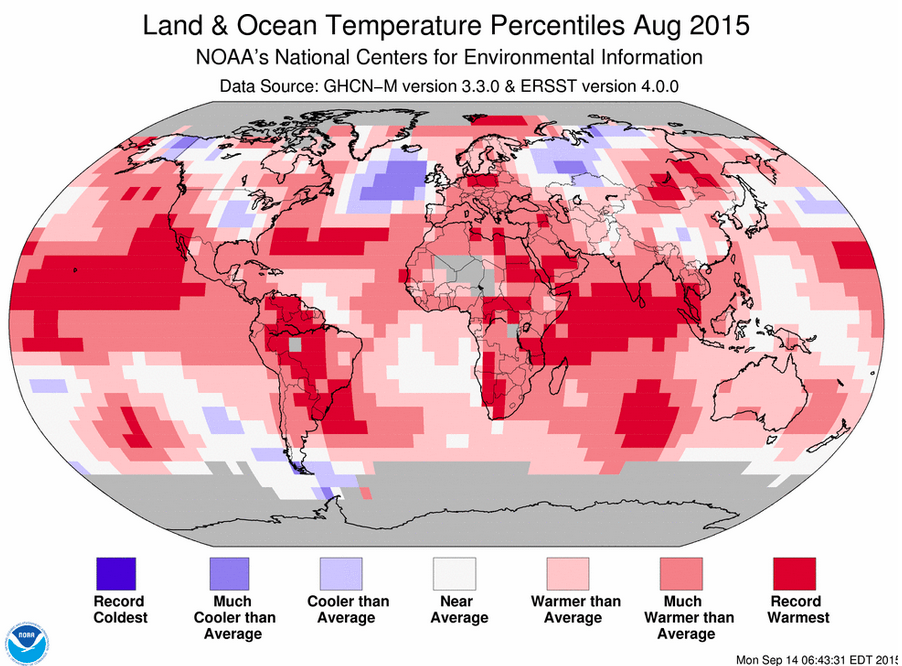Climate Change Makes Hurricane Joaquin More Dangerous Than You Think
By:
A massive hurricane is slowly moving towards the East Coast, where reports indicate that even without landfall, the chances of heavy rainfall and flooding are significantly increased. But experts say that while storm patterns are entirely natural, their potential for destruction and power are increased by a warming planet.
Hurricane Joaquin, which was upgraded to a category 4 storm this week, continued to batter islands in the Bahamas Friday as it slowly moved closer to the U.S. According to the latest weather reports, the hurricane is not likely to touch down on land, but flooding and precipitation along coastal areas, which will be hit by a combination of weather patterns in the coming days, remain a concern.
RELATED: How Much Climate Change Will Cost You if We Fail to Act
According to the National Weather Service, states in the Southeast and southern Mid-Atlantic areas can expect heavy rainfall, and coastal portions of those states have been issued safety and preparedness warnings for flooding. But experts say that warmer oceans and sea level rise—both explicitly linked to climate change—increase the damage potential and power naturally occurring weather patterns.
"Hurricane Joaquin and other tropical cyclones, which we call typhoons in the Pacific Basin, or cyclones in the Indian Ocean Basin, they're totally natural," says Brenda Ekwurzel, a senior climate scientist at the Union of Concerned Scientists. "However, there are signs that their destructive power and intensity have been growing since the 1970s, particularly in the north Atlantic."
"That can be linked back to the [fact that the] average surface temperature of the world's oceans has increased for decades," Ekwurzel told ATTN:.
RELATED: This Comic Reveals the Real Reason People Deny Climate Change
Climate scientists attribute the rapid growth of Joaquin—and the strength of previous storms like hurricane Sandy—to higher ocean temperatures, where they can flourish, spurred on by higher energy levels. "The oceans are getting warmer, largely because of climate change," Erkwurzel says.
"The oceans are buffering us, and they're taking the brunt of climate change, essentially."
Here's a recent map of August ocean temperatures, showing "record warmest" temperatures in Joaquin's path:
 National Centers for Environmental Information - noaa.gov
National Centers for Environmental Information - noaa.gov
But experts also warn that rising sea levels increase the likelihood that flooding caused by storm surges will be more destructive because water levels are already that much higher—especially when coupled with heavy rainfall that usually accompanies a hurricane.
RELATED: 6 Ways Climate Change Will Drastically Change Your Everyday Life
"Even if a tropical cyclone, hurricane, or typhoon had the same energy as centuries ago, just because of sea level rise alone we would have stronger storm surges because of climate change when these events happen," according to Erkwurzel.
Data and weather pattern models have shown a generally warmer atmosphere has the potential to hold more precipitation, leading to heavier rainfall inland, and a greater chance for damage to infrastructure, personal property, and life, she said.
"It's not just a coastal issue," Erkwurzel told ATTN:.
Other climate experts attribute sea level rise to the destruction brought on in New York City after hurricane Sandy.
"The storm itself we can't immediately link to climate change, but the flooding damage we can," Cynthia Rosenzweig, a climate impacts expert at NASA's Goddard Institute for Space Studies and co-chair of New York City's Panel on Climate Change told climate.gov. "As sea levels continue to rise, a storm of the same magnitude will cause even greater damages due to storm surges coming in on top of a higher 'baseline' water level."
Recent research has linked climate change to both more frequent and less frequent high-intensity storm patterns. But if there is one consensus, it is that whatever storms do occur could be stronger and more destructive.
"We've designed our infrastructure for the storms of the last century," Erkwurzel added, "and we're probably ill-prepared for the storms of this century."
